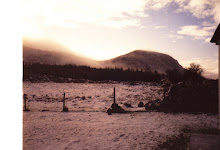
via Atlas Film
By Daniel Greenwood
This review contains self-mutilation, apparently.
In the Guardian G2 supplement a few weeks ago, fashion writer Hadley Freeman spoke out in defence of Brüno. Freeman was responding to the criticism aimed at the film by vox-pop gobbers and journos alike claiming not to have seen the film but criticising it nonetheless. Freeman’s argument was succinct – if you ground your opinion in individual, first-hand experience you will see your lazy prejudices recede.
And, obviously heeding Freeman’s article, a writer for the Daily Mail has published a piece amongst deriding Lars von Trier’s Antichrist without actually seeing it. Consequentially, the quiff himself Dr. Mark Kermode reasoned on Radio Five Live recently that you can’t deride art you haven’t experienced for yourself. But with the Internet and advanced media technologies such as TV news and portable audio-visual gizmos, the ability to wet your toe with a plethora of pies is the gift of the age.
The initial reactions to Antichrist have been in lieu of the fact that it contains explicit self-mutilation and torture. I don’t know what makes this more barbaric-sounding than Eli Roth’s Hostel movies, or the Saw lot. You’ll find as many horrible though non-sexual scenes in Mesrine: Killer Instinct (Jean-François Richet, 2009), also more cruel, and racially motivated. Perhaps Antichrist has hurt so many feelings because it stars two very convincing actors, because it is as many parts beautiful as it is unwatchable and as boring as it is horrifically rivetting. Sounds like life, right?
Willem Dafoe is He, and Charlotte Gainsbourg She, the couple the film is based around. But you probably knew that. Their son falls to his death from the window of their home in the opening sequence, a scene von Trier presents in black and white, with Handel playing over the top. It’s uber slow-motion, and, if you’d come in late to the film, you might think it was a perfume advert but for the penetration shot and the child falling from a ledge.
Gainsbourg is braced with grief and Dafoe makes the decision to step away from his role as partner to play the therapist. He runs through little exercises that don’t work. Gradually there are signs of a severe and violent side to Gainsbourg’s character, one night she cracks her forehead repeatedly against the rim of the toilet bowl. Mostly, her behaviour flares up and culminates in her mounting Dafoe, as if in reaction to her suffering. Hence the claims of misogyny by some critics.
He discusses whether a change of scenery might help, a place that she’s afraid to visit. The story moves into the woodland, an horrendously glowering mass of pine and oak trees and face-high ferns that dress the forest floor. This is no refuge. In one quietly comical scene He is distracted by an agitated fern, upon closer inspection he finds Fantastic Mr. Fox eating his own innards, ‘Chaos will reign,’ sayeth the fox. And it showers.
The couple stay in a Tarkovskian dacha reminiscent of the summer house in Mirror (Andrei Tarkovsky, 1974), and perhaps that’s why von Trier dedicates the movie to the Russian. I don’t see how a film like Antichrist, with such fine cinematography and appreciation of the frame – barring the obvious use of handheld footage of the couple – can be dedicated to someone like Tarkovsky as a joke. If Three Colours: Blue (Krzysztof Kieslowkski, 1994) is Amelie in hell, then Antichrist is in part Mirror’s antipode.
I don’t go along too much with Peter Bradshaw’s theory of Antichrist being a joke on the director’s part, though von Trier will enjoy the limelight shed by the mob. Gainsbourg’s manic sexual episodes are symbolic of a troubled woman, and von Trier hints that her trauma may not be entirely to do with her loss. She seems reactionary in her constant mounting of her partner. These acts of mindless indulgence on her part are reminiscent of modern men and women: ‘Let’s fill the aching void inherent with either alcohol, cocaine or a penis.’ One way or another.
The violence is nasty (had to cover my eyes) but it’s kind of necessary to make a point. It doesn’t make nice entertainment, but WTF, cinema isn’t entirely about entertainment. It’s a scientific medium in its construction – the lens as a glass to magnify – it can offer an insight that is entirely necessary in modern, post-Second World War society. While Antichrist isn’t Friday Night Fun at the multi-plex and goes against what the majority of cinemagoers desire (escape from the anxiety of real life) at least I can invest in it. It’s refreshing to see a movie in 2009 that a director stamps his authority on.


4 comments:
nice review.
i must see this film. it finally starts here on friday, yay.
thanks Mariola!
it's a good film, if not a little dull in the middle, but certainly gets going later on.
well, i can't say that i liked this movie, but i think yr spot on in terms of the film being pretty unwatchable and also very beautiful to watch. that said, i think it is overall pretty boring -- their grief is not all that convincing and i got tired of the psycho-babble and lame attempt at chalking it all up to her research on witches -- modern day witch story ending pretty lazy, in my opinion. i am glad you wrote about it -- just saw it a few weeks ago and it sorta stayed in my mind and bugged the fuck out of me.... i miss the days of "the idiots" and "breaking the waves"
I haven't seen any of his other films, but I'll change that.
Have you seen Mirror yet? I think that's what von Trier is getting at here, the summer house (though wintry here) is pretty much straight-outta-Mirror.
Yeah, boring at times.
Post a Comment